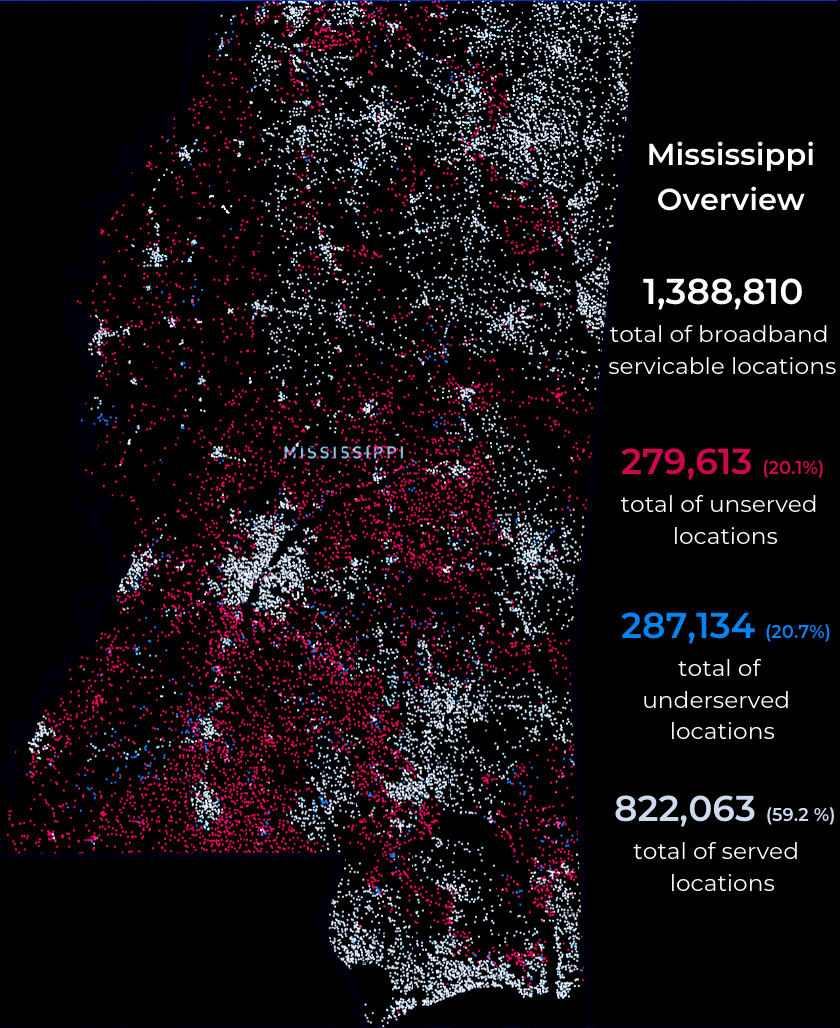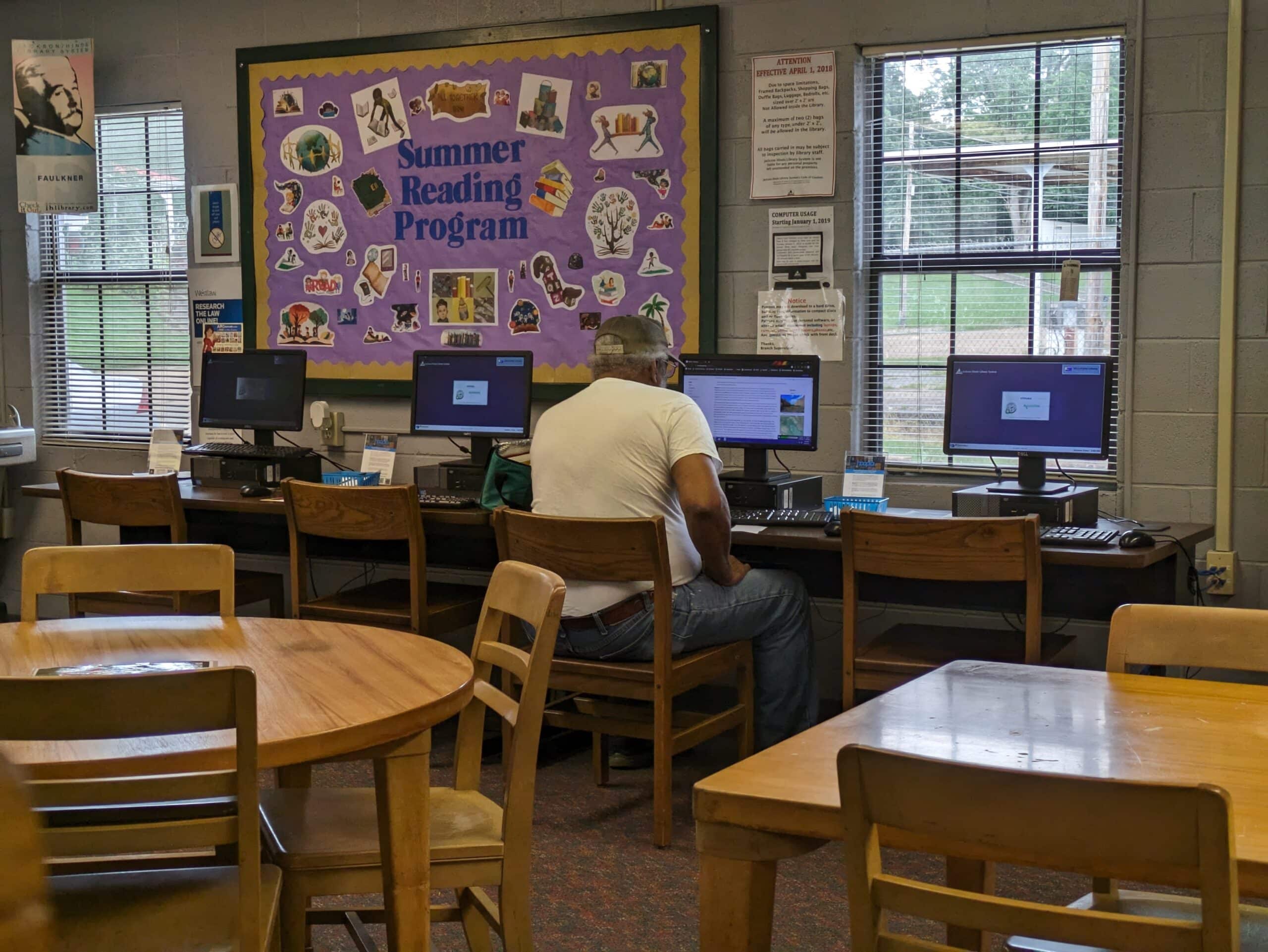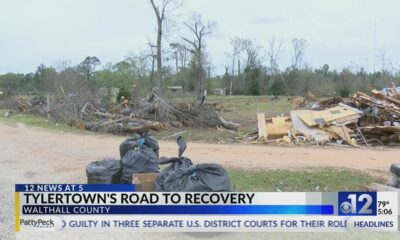Mississippi Today
Two years after funds were obligated to bring high-speed internet to more than 4,000 homes in rural northeast Madison County, zero have been served

Kadiyah Nunn was one of several employees sent to work from home by her job’s management in 2019 when COVID-19 hit Mississippi.
Dependent on her satellite service for an internet connection at her home in rural Sharon in Madison County, Nunn experienced slow internet and static calls to customers, resulting in repeated questions and statements.
After being given two weeks without pay by her employer to look for another internet service, Nunn had no luck. She was let go.
Nunn went eight months without a job and almost had her car repossessed over something she said she “had no absolute control over.”

“It was the most horrific day of my life to lose a good job,” Nunn told Mississippi Today, “not because I did anything wrong – or wasn’t completing my tasks – but because of the internet.”
Two years ago, the Madison County Board of Supervisors approved funding for over 370 miles of high speed internet to cover more than 4,000 homes in the rural northeast areas of Madison County in District 5 – carried out in collaboration with Comcast.
These areas include Camden, Sharon, Pine Grove and some parts of Canton.
As of Aug. 17, zero areas have been covered within this newly estimated $17 million project, said District 5 Supervisor Paul Griffin, president of the Madison County Board of Supervisors.
The original $22 million cost was lowered a month ago after Comcast conducted a walkthrough of where fiber would be installed.
Federal officials have been pouring billions of dollars into the expansion of high-speed internet in Mississippi, yet the tedious process of selecting providers and distributing funds has resulted in a slow rollout.
After receiving no actions and few answers from county officials, residents in the rural northeast portions of Madison County are left wondering when broadband will come to their area.
Griffin said “red tape” – actions the government requires to perform services – have delayed the project’s progress.
“It is not Madison County. It’s been the federal government getting the money down to the local government,” Griffin told Mississippi Today. “The district is waiting on the funds that have gone through the government down to the state, to move from the state down to internet providers.”
Madison County, which received over $20 million in American Rescue Plan Act funds, set aside $10 million for the project but now is contributing half of that. The county applied for a Capital Project Fund aid match through the Broadband Expansion and Accessibility of Mississippi office.
If the county receives the grant, Comcast will also contribute funds up to $7 million to cover the remaining balance, the Board of Supervisors said.
With only partial funds in hand, the project remains at a standstill.
In Madison County, a little over a fifth of the locations in the county are eligible for funding, according to the Mississippi’s broadband office. Of those locations, 73% are unserved areas.
And of the areas unserved, at least half are in the rural northern areas that Griffin said are to be prioritized.
As this delay continues, many of Madison County’s schoolchildren and adults, particularly in the least wealthy parts of the county, can’t access high-speed internet. Griffin’s advice is to just keep holding on.
“There was no future to get the internet at all until two years ago when federal funding started coming down,” Griffin told Mississippi Today. “We’ve held on that long. Hopefully we can hold on for another year.”
In Sharon, nearly all – over 94% – of locations are considered unserved and underserved, according to data collected in 2022.
When it was announced broadband high-speed internet was coming to Nunn’s area, she said she believed the community was progressing and the Board of Supervisors cared about its citizens. But with the prolonged wait, the mother of three says it’s becoming difficult to raise her family in the area she loves and grew up in.
“This is my livelihood. This is how I provide for my family,” Nunn said. “The world is technology now. You need the internet to basically do anything.”
In rural areas like Nunn’s without cable, fiber, or DSL internet access, the commonly served satellite internet providers are Viasat and HughesNet. Satellite internet is the only thing she’s able to get, but these services are not recommended for those who work from home and need high-speed connection.
The 24-year-old said she has satellite internet service with Viasat, but the 100 GB plan package she needs runs $275.45 per month, which is higher than the average cost of satellite service ($100). Nunn said the 100 GB wouldn’t even last her two days before it’s used up and begins to run slow.
“This is becoming too much. People in the Canton area mention to me that I can get Xfinity Internet that’s priced at $10 or $13 per month because I have low income and children,” Nunn continued. “I go to check. But the providers, of course, say that they don’t operate in my area.”
Mapping remains spotty during the process of expanding broadband for residents, especially those in rural communities.

Sally Doty, director of the Broadband Expansion and Accessibility of Mississippi office, said her office is working to develop a new map to be released within the next month or two that will provide an accurate representation of broadband availability across the state.
This map will be funded by the Broadband Equity, Access and Deployment program through Doty’s office out of the $1.2 billion Mississippi will receive to serve approximately 300,000 unserved and 200,000 underserved locations across the state.
Doty said this new map will help the office accurately determine where funding should be allocated and what areas still need to be addressed. It will also help residents determine what services are available to them.
“We are really kind of turning to a new way of keeping up with who has what service in some areas,” Doty continued. “As we do with all of the grants from our office and any grant that we give out, we are going to know the exact location and the addresses where (the awardee) is going to provide service.”
The broadband deployment program will begin its application process after money from the Coronavirus Capital Projects Fund has been dispersed.
A few hours before the application for those funds closed Aug. 17, there were 103 applications and over 100 applications in progress. Of the $356.4 million that providers are asking from Doty’s office, only $162 million will be dispersed.
As more funding is distributed, Doty said the number of unserved and underserved residents will continue to shift.
“We have 268,000 unserved, but I’m not quite sure how many we will serve with this (coronavirus fund) … We hope about 35,000 or more. Then, we’re down to 233,000 unserved, so that gives us more for the underserved,” Doty told Mississippi Today. “It’s a moving target all the time.”
Cynthia Johnson, a Sharon native for over 60 years, saw firsthand the importance of access to high-speed internet for children in rural areas before and after the pandemic.
Johnson has two children, ages 15 and 16, who are required to do virtual learning and submit assignments online. But with no access to high-speed internet at home, the children have missed deadlines to turn homework in by 11:59 p.m.
Johnson said she had to call the school several times to explain their situation and plead for understanding to be granted to her children.
She said she hoped to never experience hurdles like this again and to provide her children with the same educational opportunities as the rest of the county. But because the situation has persisted for so long, she is starting to feel forgotten.
“Everything is prospering and growing around us, except for our area,” Johnson told Mississippi Today. “It makes you feel like you’re in a foreign country.”
People in the community like Johnson also see benefits of working from home, considering the lack of opening positions in the area.
“There are no jobs in Sharon. The closest thing to me would be Canton, but with gas prices, you can’t get very far” Johnson said. “If you have to go 30 miles to at least get a minimum wage, then that’s not benefiting anyone.”
According to Census Bureau data, the average commute time to work in Sharon was 52.5 minutes compared to the state’s average commute time of 25.2 minutes.
Johnson said she doesn’t know how people are supposed to manage with so little resources that help the community to grow economically and socially.
“We have always got the short end of everything out here.” Johnson stated.
MediaJustice, a national grassroots movement aimed at improving communication rights, access, and power for diverse and marginalized communities, seeks to bridge the digital divide – the gap between who benefits from reliable internet connections and who doesn’t.
In early August, the California-based organization submitted a report to Mississippi’s broadband office integrating the stories and recommendations of residents and community leaders in Utica, pushing for internet access and a visit from officials.
“How can (officials) have any sense of what kind of solutions a community wants, if they haven’t even come and told the community about what kind of solutions are possible?” Brandon Forester, the national organizer for internet rights at MediaJustice, told Mississippi Today.

Forester works to help communities see that they can have a role, have agency and make decisions about the technology in their community. Forester said he relied on the power of storytelling to detail the barriers and solutions to broadband access as identified by the experiences of residents of Utica.
“The report was to say these people exist. They’re 45 minutes down the road from the Capitol. These people are completely disconnected,” Forester continued. “And the state doesn’t even realize it.”
Utica, a rural town in Hinds County of around 600 residents, found itself grappling with similar problems as those in rural Sharon: lack of internet access and high internet rates.
Forester said some residents reported not receiving the service they paid for and others required different levels of service needs. Forester said ultimately, a common theme was that the internet was too expensive.

“Part of that is because companies essentially are monopolies. AT&T and HughesNet are not competing for the same customers, so providers are able to put whatever pricing they want on these folks,” Forester said, referring to studies conducted by the Los Angeles Times and The Markup.
In rural communities, assistance can be slow due to multiple factors, but one reason is that internet providers need incentives.
Forester said for large, publicly traded corporations, their incentives may be to maximize profits for shareholders. For Electric Co-Ops – private, nonprofit companies delivering electricity to customers –, their goal may be to connect as many people as possible.
Forester said he thinks about people’s abilities to have telehealth savings, access to education and entertainment, if only rural communities had high-speed internet.
“(MediaJustice) is trying to help people figure out how to organize their resources because it may not be that the right internet solution for one area is the same as it is for another neighborhood,” Forester explained. “It’s not about us saying this is the best thing for someone, but it’s about a community being able to make choices regarding how technology shows up for them.”
This article first appeared on Mississippi Today and is republished here under a Creative Commons license.
Did you miss our previous article…
https://www.biloxinewsevents.com/?p=281532
Mississippi Today
New Stage’s ‘Little Women’ musical opens aptly in Women’s History Month
Ties that bind, not lines that divide, at the heart of “Little Women” are what make Louisa May Alcott’s beloved novel such an enduring classic. More than a century and a half since its 1868 publication, the March sisters’ coming-of-age tale continues to resonate in fresh approaches, say cast and crew in a musical version opening this week at New Stage Theatre in Jackson, Mississippi.
“Little Women, The Broadway Musical” adds songs to Alcott’s story of the four distinct March sisters — traditional, lovely Meg, spirited tomboy and writer Jo, quiet and gentle Beth, and artistic, pampered Amy. They are growing into young women under the watchful eye of mother Marmee as their father serves as an Army chaplain in the Civil War. “Little Women, The Broadway Musical” performances run March 25 through April 6 at New Stage Theatre.
In a serendipitous move, the production coincides with Women’s History Month in March, and has a female director at the helm — Malaika Quarterman, in her New Stage Theatre directing debut. Logistics and scheduling preferences landed the musical in March, to catch school matinees with the American classic.
The novel has inspired myriad adaptations in film, TV, stage and opera, plus literary retellings by other authors. This musical version debuted on Broadway in 2005, with music by Jason Howland, lyrics by Mindi Dickstein and book (script) by Allan Knee.
“The music in this show brings out the heart of the characters in a way that a movie or a straight play, or even the book, can’t do,” said Cameron Vipperman, whose play-within-a-play role helps illustrate the writer Jo’s growth in the story. She read the book at age 10, and now embraces how the musical dramatizes, speeds up and reconstructs the timeline for more interest and engagement.
“What a great way to introduce kids that haven’t read the book,” director Quarterman said, hitting the highlights and sending them to the pages for a deeper dive on characters they fell in love with over the two-and-a-half-hour run time.

Joy, familial warmth, love, courage, loss, grief and resilience are all threads in a story that has captivated generations and continues to find new audiences and fresh acclaim (the 2019 film adaptation by Greta Gerwig earned six Academy Award nominations).
In current contentious times, when diversity, equity and inclusion programs are being ripped out or rolled back, the poignant, women-centered narrative maintains a power to reach deep and unite.
“Stories where females support each other, instead of rip each other apart to get to the finish line — which would be the goal of getting the man or something — are very few and far between sometimes,” Quarterman said. “It’s so special because it was written so long ago, with the writer being such a strong dreamer, and dreaming big for women.
“For us to actualize it, where a female artistic producer chooses this show and believes in a brand new female director and then this person gets to empower these great, local, awesome artists — It’s just really been special to see this story and its impact ripple through generations of dreamers.” For Quarterman, a 14-year drama teacher with Jackson Public Schools active in community theater and professional regional theater, “To be able to tell this story here, for New Stage, is pretty epic for me.”
Alcott’s story is often a touchstone for young girls, and this cast of grown women finds much in the source material that they still hold dear, and that resonates in new ways.

“I relate to Jo more than any other fictional character that exists,” Kristina Swearingen said of her character, the central figure Jo March. “At different parts of my life, I have related to her in different parts of hers.”
The Alabama native, more recently of New York, recalled her “energetic, crazy, running-around-having-a-grand-old-time” youth in high school and college, then a career-driven purpose that led her, like Jo, to move to New York.
Swearingen first did this show in college, before the loss of grandparents and a major move. Now, “I know what it’s like to grieve the loss of a loved one, and to live so far away from home, and wanting to go home and be with your family but also wanting to be in a place where your career can take off. .. It hits a lot closer to home.”
As one of four sisters in real life, Frannie Dean of Flora draws on a wealth of memories in playing Beth — including her own family position as next to the youngest of the girls. She and siblings read the story together in their homeschooled childhood, assigning each other roles.

“Omigosh, this is my life,” she said, chuckling. “We would play pretend all day. … ‘Little Women’ is really sweet in that aspect, to really be able to carry my own experience with my family and bring it into the show. … It’s timeless in its nature, its warmth and what it brings to people.”
Jennifer Smith of Clinton, as March family matriarch Marmee, found her way in through a song. First introduced to Marmee’s song “Here Alone” a decade ago when starting voice lessons as an adult, she made it her own. “It became an audition piece for me. It became a dream role for me. It’s been pivotal in opening up doors for me.”
She relishes aging into this role, countering a common fear of women in the entertainment field that they may “age out” of desirable parts. “It’s just a full-circle moment for me, and I’m grateful for it.”

Quarterman fell in love with the 1969 film version she watched with her sister when they were little, adoring the family’s playfulness and stability. Amid teenage angst, she identified with the inevitable growth and change that came with siblings growing up and moving on. Being a mom brings a whole different lens.
“Seeing these little people in your life just growing up, being their own unique versions, all going through their own arc — it’s just fun, and I think that’s why you can stay connected” to the story at any life juncture, she said.
Cast member Slade Haney pointed out the rarity of a story set on a Northeastern homestead during the Civil War.
“You’re getting to see what it was like for the women whose husbands were away at war — how moms struggled, how sisters struggled. You had to make your own means. … I think both men and women can see themselves in these characters, in wanting to be independent like Jo, or like Amy wanting to have something of value that belongs to you and not just just feel like you’re passed over all the time, and Meg, to be valuable to someone else, and in Beth, for everyone to be happy and content and love each other,” Haney said.
New Stage Theatre Artistic Director Francine Reynolds drew attention, too, to the rarity of an American classic for the stage offering an abundance of women’s roles that can showcase Jackson metro’s talent pool. “We just always have so many great women,” she said, and classics — “To Kill a Mockingbird” and “Death of a Salesman,” for instance — often offer fewer parts for them, though contemporary dramas are more balanced.
Reynolds sees value in the musical’s timing and storyline. “Of course, we need to celebrate the contributions of women. This was a woman who was trying to be a writer in 1865, ’66, ’67. That’s, to me, a real trailblazing thing.
“It is important to show, this was a real person — Louisa May Alcott, personified as Jo. It’s important to hold these people up as role models for other young girls, to show that you can do this, too. You can dream your dream. You can strive to break boundaries.”
It is a key reminder of advancements that may be threatened. “We’ve made such strides,” Reynolds said, “and had so many great programs to open doors for people, that I feel like those doors are going to start closing, just because of things you are allowed to say and things you aren’t allowed.”
For tickets, $50 (discounts for seniors, students, military), visit www.newstagetheatre.com or the New Stage Theatre box office, or call 601-948-3533.
This article first appeared on Mississippi Today and is republished here under a Creative Commons license.![]()
Mississippi Today
Rolling Fork – 2 Years Later

Tracy Harden stood outside her Chuck’s Dairy Bar in Rolling Fork, teary eyed, remembering not the EF-4 tornado that nearly wiped the town off the map two years before. Instead, she became emotional, “even after all this time,” she said, thinking of the overwhelming help people who’d come from all over selflessly offered.
“We’re back now, she said, smiling. “People have been so kind.”


“I stepped out of that cooler two years ago and saw everything, and I mean, everything was just… gone,” she said, her voice trailing off. “My God, I thought. What are we going to do now? But people came and were so giving. It’s remarkable, and such a blessing.”

“And to have another one come on almost the exact date the first came,” she said, shaking her head. “I got word from these young storm chasers I’d met. He told me they were tracking this one, and it looked like it was coming straight for us in Rolling Fork.”
“I got up and went outside.”
“And there it was!”
“I cannot tell you what went through me seeing that tornado form in the sky.”
The tornado that touched down in Rolling Fork last Sunday did minimal damage and claimed no lives.
Horns honk as people travel along U.S. 61. Harden smiles and waves.
She heads back into her restaurant after chatting with friends to resume grill duties as people, some local, some just passing through town, line up for burgers and ice cream treats.


Rolling Fork is mending, slowly. Although there is evidence of some rebuilding such as new homes under construction, many buildings like the library and post office remain boarded up and closed. A brutal reminder of that fateful evening two years ago.


















This article first appeared on Mississippi Today and is republished here under a Creative Commons license.![]()
Mississippi Today
Remembering Big George Foreman and a poor guy named Pedro
George Foreman, surely one of the world’s most intriguing and transformative sports figures of the 20th century, died over the weekend at the age of 76. Please indulge me a few memories.
This was back when professional boxing was in its heyday. Muhammad Ali was heavyweight champion of the world for a second time. The lower weight divisions featured such skilled champions and future champs as Alex Arugello, Roberto “Hands of Stone” Duran, Tommy “Hit Man” Hearns and Sugar Ray Leonard.
Boxing was front page news all over the globe. Indeed, Ali was said to be the most famous person in the world and had stunned the boxing world by stopping the previously undefeated Foreman in an eighth round knockout in Kinshasa, Zaire, in October of 1974. Foreman, once an Olympic gold medalist at age 19, had won his previous 40 professional fights and few had lasted past the second round. Big George, as he was known, packed a fearsome punch.
My dealings with Foreman began in January of 1977, roughly 27 months after his Ali debacle with Foreman in the middle of a boxing comeback. At the time, I was the sports editor of my hometown newspaper in Hattiesburg when the news came that Foreman was going to fight a Puerto Rican professional named Pedro Agosto in Pensacola, just three hours away.
Right away, I applied for press credentials and was rewarded with a ringside seats at the Pensacola Civic Center. I thought I was going to cover a boxing match. It turned out more like an execution.
The mismatch was evident from the pre-fight introductions. Foreman towered over the 5-foot, 11-inch Agosto. Foreman had muscles on top of muscles, Agosto not so much. When they announced Agosto weighed 205 pounds, the New York sports writer next to me wise-cracked, “Yeah, well what is he going to weigh without his head?”
It looked entirely possible we might learn.
Foreman toyed with the smaller man for three rounds, almost like a full-grown German shepherd dealing with a tiny, yapping Shih Tzu. By the fourth round, Big George had tired of the yapping. With punches that landed like claps of thunder, Foreman knocked Agosto down three times. Twice, Agosto struggled to his feet after the referee counted to nine. Nearly half a century later I have no idea why Agosto got up. Nobody present– or the national TV audience – would have blamed him for playing possum. But, no, he got up the second time and stumbled over into the corner of the ring right in front of me. And that’s where he was when Foreman hit him with an evil right uppercut to the jaw that lifted the smaller man a foot off the canvas and sprayed me and everyone in the vicinity with Agosto’s blood, sweat and snot – thankfully, no brains. That’s when the ref ended it.
It remains the only time in my sports writing career I had to buy a T-shirt at the event to wear home.
So, now, let’s move ahead 18 years to July of 1995. Foreman had long since completed his comeback by winning back the heavyweight championship. He had become a preacher. He also had become a pitch man for a an indoor grill that bore his name and would sell more than 100 million units. He was a millionaire many times over. He made far more for hawking that grill than he ever made as a fighter. He had become a beloved figure, known for his warm smile and his soothing voice. And now he was coming to Jackson to sign his biography. His publishing company called my office to ask if I’d like an interview. I said I surely would.
One day at the office, I answered my phone and the familiar voice on the other end said, “This is George Foreman and I heard you wanted to talk to me.”
I told him I wanted to talk to him about his book but first I wanted to tell him he owed me a shirt.
“A shirt?” he said. “How’s that?”
I asked him if remembered a guy named Pedro Agosto. He said he did. “Man, I really hit that poor guy,” he said.
I thought you had killed him, I said, and I then told him about all the blood and snot that ruined my shirt.
“Man, I’m sorry about that,” he said. “I’d never hit a guy like that now. I was an angry, angry man back then.”
We had a nice conversation. He told me about finding his Lord. He told me about his 12 children, including five boys, all of whom he named George.
I asked him why he would give five boys the same name.
“I never met my father until late in his life,” Big George told me. “My father never gave me nothing. So I decided I was going to give all my boys something to remember me by. I gave them all my name.”
Yes, and he named one of his girls Georgette.
We did get around to talking about his book, and you will not be surprised by its title: “By George.”
This article first appeared on Mississippi Today and is republished here under a Creative Commons license.![]()
://mississippitoday.org”>Mississippi Today.
-

 Local News Video6 days ago
Local News Video6 days agoLocal pharmacists advocating for passage of bill limiting control of pharmacy benefit managers
-

 News from the South - Florida News Feed7 days ago
News from the South - Florida News Feed7 days agoDeSantis returns millions in federal funds as Florida cities receive DOGE letters
-

 News from the South - Florida News Feed7 days ago
News from the South - Florida News Feed7 days agoFlorida boy 'tortured' by mom, her boyfriend dies weeks after hospitalization, police say
-

 News from the South - Florida News Feed4 days ago
News from the South - Florida News Feed4 days agoFamily mourns death of 10-year-old Xavier Williams
-

 News from the South - Florida News Feed6 days ago
News from the South - Florida News Feed6 days agoLIVE: SpaceX NROL-69 mission launch
-

 News from the South - Arkansas News Feed5 days ago
News from the South - Arkansas News Feed5 days agoReport: Proposed Medicaid, SNAP cuts would cost Arkansas thousands of jobs, $1B in GDP
-

 News from the South - North Carolina News Feed5 days ago
News from the South - North Carolina News Feed5 days agoClassmates remember college student hit by car, killed near NC State
-

 News from the South - Alabama News Feed5 days ago
News from the South - Alabama News Feed5 days ago1 Dead, Officer and Bystander Hurt in Shootout | March 25, 2025 | News 19 at 9 p.m.















































